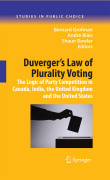
Duverger's law of plurality voting: the logic of party competition in Canada, India, the United Kingdom and the United States
Grofman, B.
Blais, A.
Bowler, S.
Maurice Duverger is arguably the most distinguished French political scientist of the last century, but his major impact has, strangely enough, been largely in the English-speaking world. His book, Political Parties, first translatedinto English in 1954, has been very influential in both the party politics literature (which continues to make use of his typology of party organization) and in the electoral systems literature. His chief contributions there deal with what have come to be called in his honor Duverger’s Law and Duverger’s Hypothesis. The first argues that countries with plurality-based electoral methods will tend to become two-party systems; the second argues that countries using proportional representation (PR) methods will tend to become multi-party systems. Duverger also identifies specific mechanisms that will produce these effects, conventionally referred to as ‘mechanical effects’, and ‘psychological effects’ International coverage of the four major examples of plurality voting: U.S., U.K., Canada, India Rigorous comparative analysis, with emphasis on both theoretical and practical implications Prolific editors and expert contributors, well-known to the academic/research communities INDICE: Introduction.- Part I. Voting Strategically in Canada and Britain.- Neither Representative Nor Accountable.- Strategic Voting in the United States.- Seats to Votes Ratios in the United States.- Part II. Canada.- Party Inflation in India.- The Puzzle of Non-Duvergerian Equilibria in the United Kingdom.- Duverger’s Law in the United States.
- ISBN: 978-0-387-09719-0
- Editorial: Springer
- Encuadernacion: Cartoné
- Páginas: 225
- Fecha Publicación: 01/04/2009
- Nº Volúmenes: 1
- Idioma: Inglés
